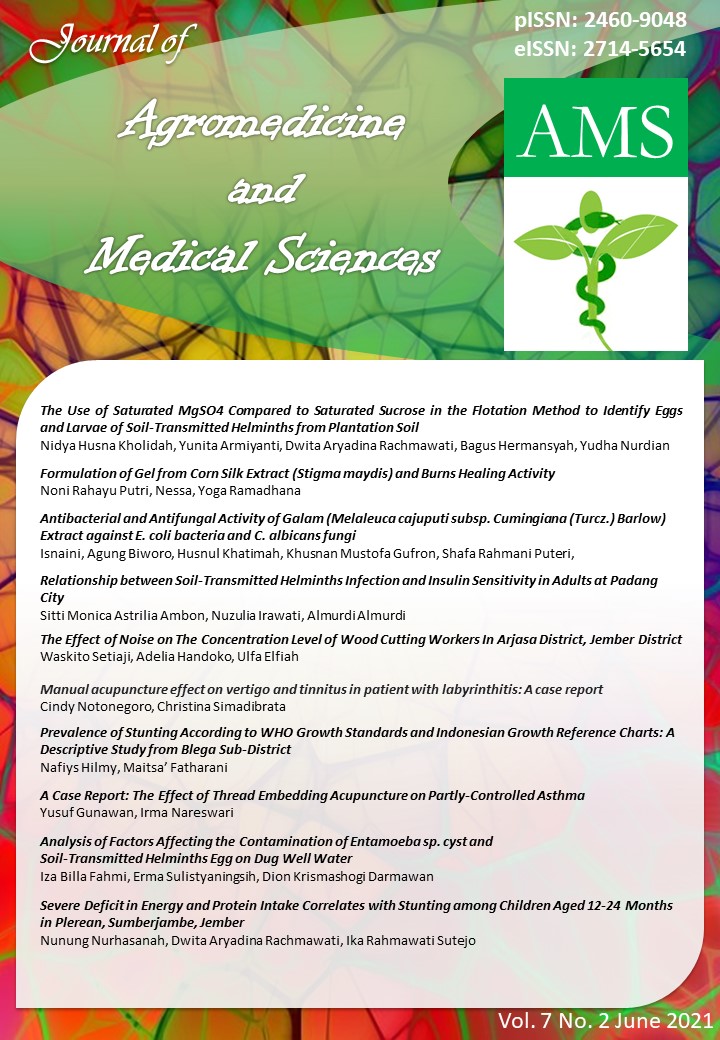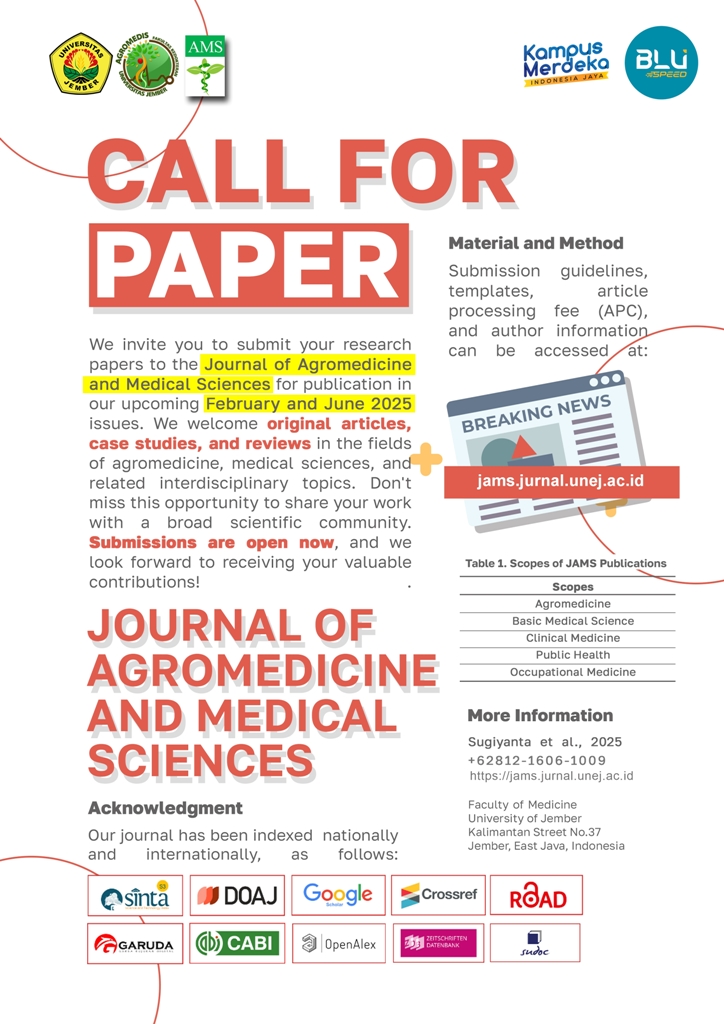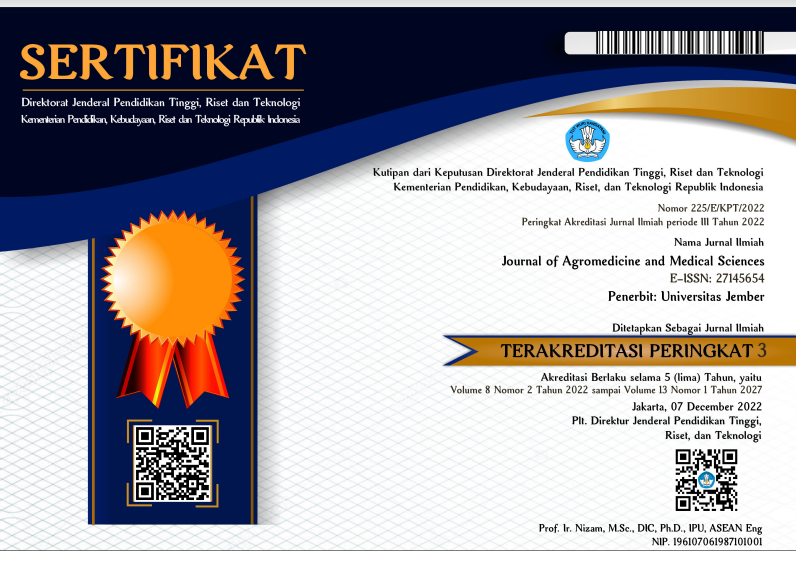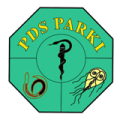Analysis of Factors Affecting the Contamination of Entamoeba sp. cyst and Soil-Transmitted Helminths egg on Dug Well Water
DOI:
https://doi.org/10.19184/ams.v7i2.22233Abstract
Dug well water is often polluted by fecal waste containment such as septic tank and pit latrine system due to its distance. The common pathogenic parasites found in fecal waste containment are E. histolytica and Soil-Transmitted Helminths (STH). The port de entry of both parasites is ingestion of contaminated food or water by fecal materials. This study was aimed to analyze factors affecting the existence of Entamoeba sp. cyst and STH egg on dug well water in Bungatan Village, Situbondo. This observational analytic study used cross-sectional approach, carried out 30 respondents in Bungatan Village, Situbondo. Entamoeba sp. cyst and STH egg were examined using sedimentation method, the distance of fecal waste containment to dug well measured by measuring tape. The characteristic of fecal waste containment and dug well was observed using questionnaires. The results showed 100% fecal containment used pit latrine system, 100% had an incomplete well standard, 66,7% had unstandardized distance with fecal waste containment. Entamoeba sp. cyst and STH egg were not found on all water samples. The soil condition near the dug well (acidity, temperature, moisture, and sunlight intensity) and physical condition (temperature) of dug well water were inappropriate to the development of Entamoeba sp. cyst and STH egg. The dug well's component and its distance to fecal containment did not affect Entamoeba sp. cyst and STH egg existence in all dug well water. The physical soil condition near the dug well and the temperature of dug well water were inappropriate to the development of both parasites.
Keywords: Entamoeba sp., Soil Transmitted Helminths, Dug Well, Fecal Waste Containment
Downloads
References
Annisa, S., Dalilah, & C. Anwar. (2018). Hubungan Infeksi Cacing Soil Transmitted Helminths (STH) dengan Status Gizi pada Siswa Sekolah Dasar Negeri 200 Kelurahan Kemasrindo Kecamatan Kertapati Kota Palembang. Majalah Kedokteran Sriwijaya. https://doi.org/10.36706/mks.v50i2.8553
Ayed, L.B. & S. Sabbahi. (2017). Entamoeba histolytica. Global Water Pathogen Project Part Three, Spesific Excreted Pathogens : Environmental and Epidemiology Aspects. Michigan State University, E. Lansing, MI, UNESCO.https://doi.org/10.14321/waterpathogens.34
Badan Pusat Statistik. (2017). Statistik Kesejahteraan Rakyat (Welfare Statistics) 2017. Jakarta: Badan Pusat Statistik. DOI:10.12983/IJSRES-2015-P0016-0022
CASFS. (2020). Soil and Soil Physical Properties. https://casfs.ucsc.edu/about/publications/Teaching-Organic-Farming/PDF-downloads/2.1-soilphysical.pdf. [Accessed on 25 November 2020].
CDC. (2019). Amebiasis. https://www.cdc.gov/dpdx/amebiasis/index.html. [Accessed on 25 Oktober 2019].
Deby, P., P. Andarani, & Sudarno. (2016). Pengaruh Sistem Pengelolaan Air Limbah Domestik Terhadap Kualitas Air Sumur Ditinjau dari Konsentrasi TDS, Nitrat, Klorida, COD dan Total Koliform (Studi Kasus: RT 03, RW 01, Kelurahan Kramas, Kecamatan Tembalang). Jurnal Teknik Lingkungan. 5(1): 1–10.
Etewa, S. E., S. A. A. Rahem, N. F. A. E. Aal, G. M. Fathy, M. A. E. Shafey, & A. M. G. Ewis. (2014). Geohelminths Distribution as Affected by Soil Properties, Physicochemical Factors and Climate in Sahrkyia Governorate Egypt. Journal of Parasitic Disase. 40(2): 496-504. doi: 10.1007/s12639-014-0532-5
Eze, C. L. & Eze, E. M. (2015). Investigation of Possible Groundwater Contamination from Septic System Siting in Port Harcourt, Nigeria. Journal of Natural Science Research. 5(10): 83-87.
Ferrer, A., H. N. Viet, & J. Zinsstag. (2012). Quantification of Diarrhea Risk Related to Wastewater Contact in Thailand. Ecohealth. 9: 49-59. doi: 10.1007/s10393-012-0746-x
Firdayati, M., P. A. Notodarmojo, B. S. Muntalif, D. Trihartomo, I. S. Fathuna, & K. Somantri. (2018). Helminth Eggs Parameter of Water Spinach Agriculture Field in Bandung. Indonesian Journal of Urban and Environmental Technology. 2(1): 27-34. DOI: http://dx.doi.org/10.25105/urbanenvirotech.v2i1.3553
Grego, S., V. Barani, M. H. Craver, A. Raj, P. Perumal, A. B. Berg, & C. Archer. (2018). Soil Transmitted Helminth Eggs Assessment in Wastewater in an Urban Area in India. Journal of Water and Health. doi: 10.2166/wh.2017.147.
Hairani, B. (2015). Keberadaan Telur dan Larva Cacing Tambang pada Tanah di Lingkungan Desa Sepunggur dan Desa Gunung Tinggi Kabupaten Tanah Bumbu Kalimantan Selatan Tahun 2014. Jurnal Vektor Penyakit. 9(01): 15-20. DOI : 10.22435/vektorp.v9i1.5040.15-20
Hasanah, N. R. M., J. MTS, & R. Purnaini. (2014). Pengaruh Rembesan Cubluk Terhadap Kualitas Air Permukiman dan Air Tanah di Kota Pontianak. Jurnal Teknologi Lingkungan Lahan Basah. 2(01). DOI: http://dx.doi.org/10.26418/jtllb.v2i1.7289
Jaykus, L. A., M. Woolridge, J. M. Frank, M. Miraglia, A. M. Q. Gollop, & C. Tirado. (2009). Climate Change: Implications for food Safety. Roma, Italia.
Kementerian Pekerjaan Umum dan Perumahan Rakyat. 2017. Sumur Gali. Jakarta.
Malavade, S. S. (2015). Assessment of Soil Transmitted Helminth Infection (STHI) in School Children, Risk Factors, Interactions and Environmental Control in El Savador. Tesis. Florida : Department of Global Health College of Public Health University of South Florida.
Marsono. (2009). Faktor-Faktor yang Berhubungan dengan Kualitas Bakteriologis Air Sumur Gali di Permukiman. Tesis. Semarang: Program Pascasarjana Universitas Diponegoro Semarang.
Moreno, A. R. (2006). Climate Change and Human Health in Latin America: Drivers, Effects, and Policies. Regional Environment Change. 6: 157-164. DOI:10.1007/s10113-006-0015-z
Muslimawati, N. M. & P. Widayani. (2016). Analisis Spasial Penyakit Kecacingan Soil Transmitted Helminth dengan Karakteristik Tanah Melalui Pendekatan Geomorfologi di Kabupaten Bantul. Jurnal Bumi Indonesia. 5(1).
Paller, V. G. V. & E. R. C. D. Chavez. (2014). Toxocara (Nematoda: Ascaridida) and Other Soil-Transmitted Helminth Eggs Contaminating Soils in Selected Urban and Rural Areas in the Philippines. The Scientific World Journal. doi: 10.1155/2014/386232.
Peraturan Menteri Kesehatan Republik Indonesia Nomor 32 Tahun 2017. Standar Baku Mutu Kesehatan Lingkungan dan Persyaratan Kesehatan Air untuk Higiene Sanitasi, Kolam Renang, Solus Per Aqua, dan Pemandian Umum. 31 Mei 2017. Jakarta.
Pusat Penelitian dan Pengembangan Permukiman Balitbang Kementerian Pekerjaan Umum. (2014). Sumur Gali. Bandung: Pusat Penelitian dan Pengembangan Permukiman.
Rusydi, A. F., W. Naily, & H. Lestiana. (2015). Pencemaran Limbah Domestik dan Pertanian Terhadap Air Tanah Bebas di Kabupaten Bandung. Riset Geologi dan Pertambangan. 25(2): 87–97. DOI: http://dx.doi.org/10.14203/risetgeotam2015.v25.201
Samuel, F. (2015). Status of Soil-Transmitted Helminths Infection in Ethiopia. American Journal of Health Research. 3(3): 170-176. DOI:10.11648/j.ajhr.20150303.21
Sutandi, M. C. (2012). Air Tanah. Fakultas Teknik Jurusan Teknik Sipil Universitas Kristen Maranatha. Bandung.
Sutanto, I., I. S. Ismid, P. K. Sjariffudin & S. Sungkar. (2008) Buku Ajar Parasitologi Kedokteran. Edisi Keempat. Jakarta: Badan Penerbit FK UI.
Tarigan, E. S. B., Guchi, H., & Marbun, P. (2015). Evaluasi Status Bahan Organik dan Sifat Fisik Tanah (Bulk Density, Tekstur, Suhu Tanah) pada Lahan Tanaman Kopi (Coffea Sp.) di Beberapa Kecamatan Kabupaten Dairi. Jurnal Online Agroekoteknologi. 3(01): 246-256. DOI: 10.32734/jaet.v3i1.9474
Thompson, R. C. A. & A. Smith. (2011). Zoonotic Enteric Protozoa. Veterinary Parasitology. 182: 70-78. doi: 10.1016/j.vetpar.2011.07.016.
Tim Pelaksana Kelompok Kerja Sanitasi Kabupaten Situbondo. (2013). Laporan Penilaian Resiko Kesehatan Lingkungan (EHRA) Kabupaten Situbondo.
Vijayakumar, K. (2013). Hubungan Diare dengan Pencemaran Air Bersih oleh Parasit dan Tingkat Pengetahuan Penggunaan Air Bersih oleh Penduduk di Kampung Susuk, Kecamatan Medan Selayang. Skripsi. Medan: Fakultas Kedokteran Universitas Sumatera Utara.
WHO. (2017). Diarrhoeal disease. https://www.who.int/news-room/fact-sheets/detail/diarrhoeal-disease. [Accessed on 24 Oktober 2019].
WHO. (2019). Soil-Transmitted Helminth infectons. https://www.who.int/news-room/fact-sheets/detail/soil-transmitted-helminth-infections. [Accessed on 25 Oktober 2019].
Wulandari, D., F. Abdullah, M. K. A. Rasyid, & T. H. W. Kristyanto. (2017). Intensifikasi Eksplorasi Sumber Mata Air Sebagai Upaya Pencegahan Penurunan Muka Air Tanah Kota Bandung. Proceeding, Seminar Nasional Kebumian ke-10























